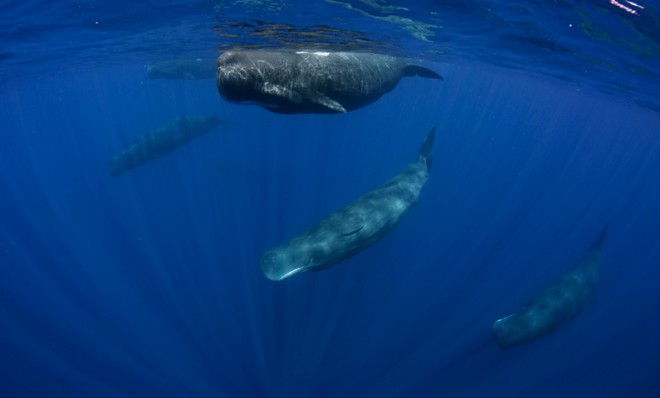Why whales can hold their breath for a long time — and you can't
It's not only because they have huge lungs

A free daily email with the biggest news stories of the day – and the best features from TheWeek.com
You are now subscribed
Your newsletter sign-up was successful
Marine mammals have all kinds of wonderful adaptations to lead a comfortable life underwater, such as flippers and insulating blubber. Whales even have eyes that can see in monochrome, which is especially valuable deep beneath the surface where sunlight is at a premium.
But one of the whales' more fascinating adaptations is their enviable ability to hold their breath underwater for up to an hour at a time. Scientists know it has something to do with their myoglobin, a molecule in the blood that helps the body's muscles retain oxygen. In creatures like cows and humans, myoglobin is known for giving flesh its reddish tinge; seals and whales, on the other hand, have extremely high myoglobin concentrations that make their tissue look black.
Researcher Michael Berenbrink, a zoologist at the University of Liverpool, thought that was peculiar. "At high enough concentrations, [proteins] tend to stick together," Berenbrink tells BBC News. When too many proteins clump together, they become useless — dead weight.
The Week
Escape your echo chamber. Get the facts behind the news, plus analysis from multiple perspectives.

Sign up for The Week's Free Newsletters
From our morning news briefing to a weekly Good News Newsletter, get the best of The Week delivered directly to your inbox.
From our morning news briefing to a weekly Good News Newsletter, get the best of The Week delivered directly to your inbox.
So just how do densely packed myoglobin molecules in aquatic mammals keep from sticking together? BBC News reports:
The team extracted pure myoglobin from the muscles of mammals — from the land-based cow, to the semi-aquatic otter, all the way up elite divers like the sperm whale.
Led by researcher Scott Mirceta, this painstaking examination traced the changes in myoglobin in deep-diving mammals through 200 million years of evolutionary history.
And it revealed that the best mammalian breath-holding divers had evolved a non-stick variety of myoglobin. [BBC News]
The trick, apparently, is that the myoglobin of marine animals is positively charged, like one end of a magnet. Instead of clumping together, the molecules repel one another away, ensuring the blood stays loose and lubricated.
The whale's ability to hold its breath is, in a way, an evolutionary one-two punch: (1) The high concentration of myoglobin allows it to spend more time underwater in between breaths, and (2) the myoglobin's positive charge ensures the proteins don't clump together and kill the animal. Researchers say that mimicking this natural chemistry could have an impact in medical science, particularly in the way we humans perform blood transfusions.
Berenbrink at his team even went so far as to reconstruct the myoglobin sequences of the whale's ancestors to pinpoint when the evolutionary adaptation may have occurred. "If you give me a myoglobin sequence, I can tell you if the animal is a good diver or not," says Berenbrink. Nature explains:
A free daily email with the biggest news stories of the day – and the best features from TheWeek.com
Using the reconstructed sequences from different animals to infer the electric charge on their myoglobin, together with information about the animal's body mass, the team was able to determine that an early whale ancestor — the terrestrial, wolf-sized animal Pakicetus — couldn't stay under water for much more than 90 seconds. But the larger, six-ton Basilosaurus, which appeared about 15 million years later than Pakicetus, could manage about 17 minutes. Many modern whales can remain submerged for more than an hour. [Nature]